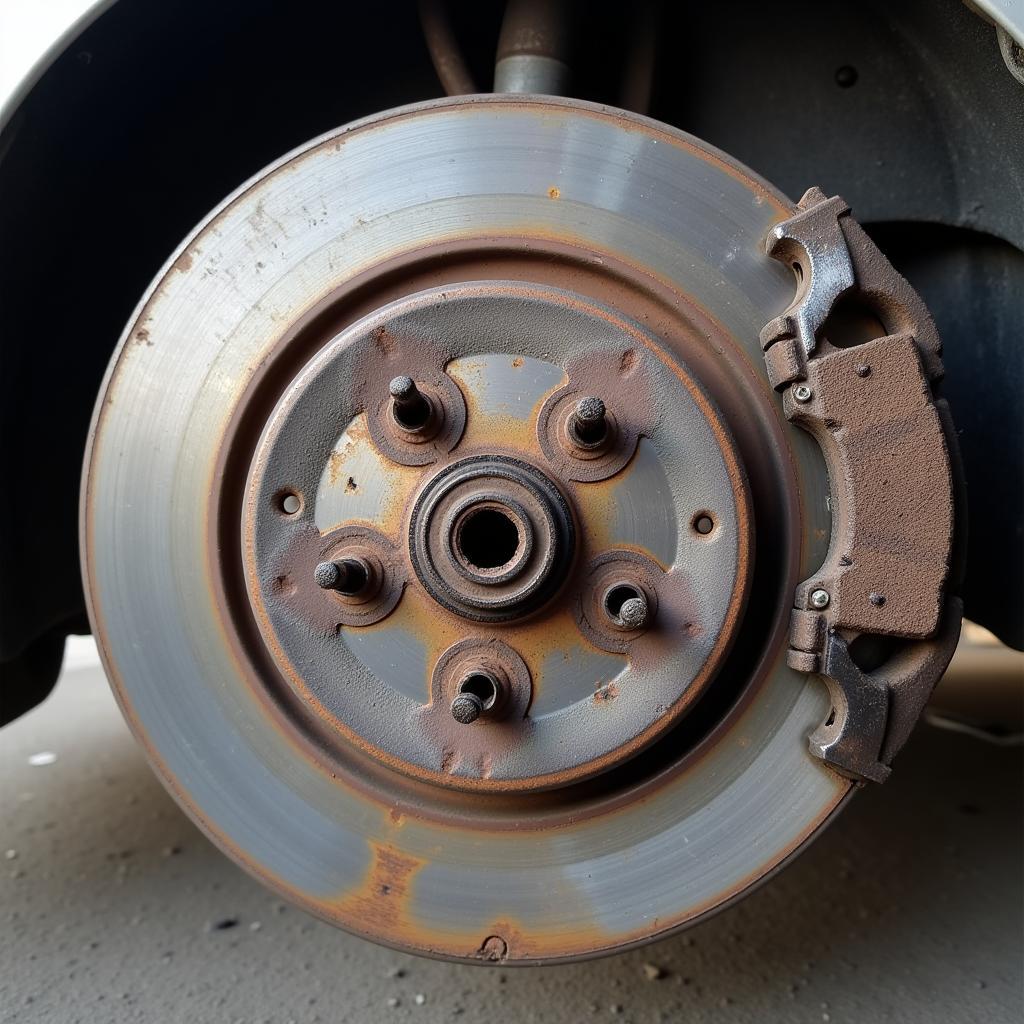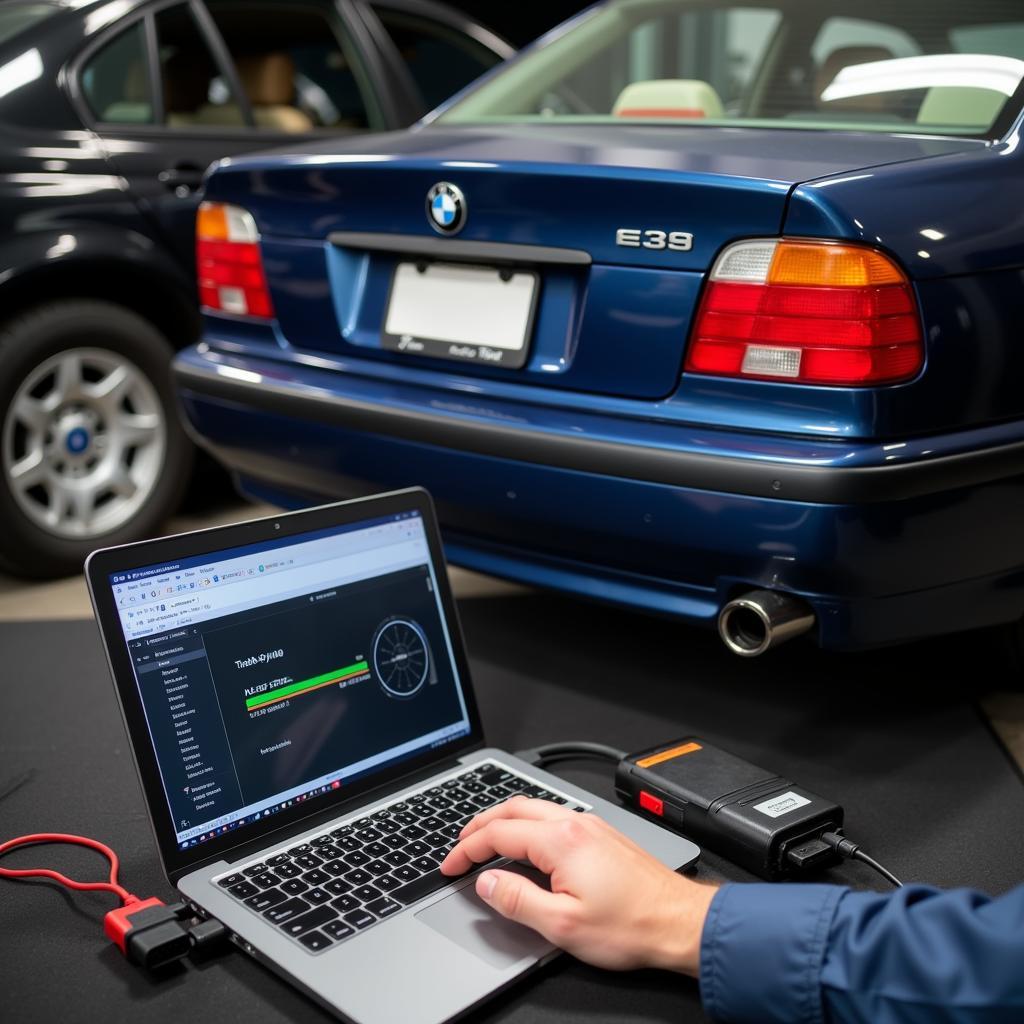Seeing a brake light warning illuminated on your E39 BMW’s dashboard can be unsettling. It signals a potential issue with your braking system, demanding immediate attention. While it might seem daunting, understanding the common causes behind this warning light can help you diagnose and potentially fix the problem yourself. This article explores the common reasons your E39 BMW might display a brake light warning and offers practical solutions.
Common Causes of an E39 BMW Brake Light Warning
Several factors can trigger the brake light warning on your E39. Let’s delve into the most common culprits:
1. Worn Brake Pads
 Worn brake pads on a BMW E39
Worn brake pads on a BMW E39
This is the most frequent reason for the brake light warning. Your E39 is designed with brake pad wear sensors that trigger the warning light when the pads thin down to a critical level, indicating the need for replacement.
2. Low Brake Fluid Level
Brake fluid is the lifeblood of your car’s braking system. A leak in the system or naturally depleting fluid levels over time can cause the brake light to illuminate. It’s crucial to check the brake fluid level and top it up if necessary. If you notice a consistent drop in the fluid level, it indicates a leak that requires professional attention.
3. Faulty Brake Light Switch
The brake light switch, activated when you press the brake pedal, could be malfunctioning. A faulty switch might prevent the brake lights from illuminating or cause them to stay lit even when the pedal isn’t pressed.
4. ABS Sensor Issues
Your E39 utilizes an Anti-lock Braking System (ABS) for optimal braking performance. A malfunctioning ABS sensor can disrupt the system and trigger the brake warning light. Diagnosing ABS sensor issues typically requires a diagnostic tool.
5. Issues with the Brake Caliper
While less common, a seized brake caliper or issues with the caliper piston can also trigger the brake warning light. This situation often leads to uneven brake pad wear and requires immediate attention.
Troubleshooting the Brake Light Warning
Before heading to a mechanic, you can perform some basic checks:
- Inspect the Brake Pads: Check the thickness of your brake pads. If they appear significantly worn down, it’s time for a replacement.
- Check Brake Fluid Level: Open the hood and locate the brake fluid reservoir. Ensure the fluid level is between the minimum and maximum markers.
- Inspect Brake Lights: Have a friend press the brake pedal while you check if all brake lights illuminate correctly.
“It’s crucial to remember that your car’s braking system is critical for safety. If you’re uncomfortable diagnosing or addressing these issues yourself, it’s always best to consult a qualified BMW mechanic,” advises Mark Stevenson, a veteran automotive engineer with over 20 years of experience specializing in European vehicles.
Remote Diagnostics and Programming: A Modern Solution
 Remote diagnostics and programming on a BMW E39 using a laptop
Remote diagnostics and programming on a BMW E39 using a laptop
In today’s digitally connected world, remote diagnostics and programming offer a convenient and efficient solution for certain BMW E39 brake warning light issues. Specialized services allow qualified technicians to remotely access your vehicle’s computer system, diagnose problems, and even install software updates or reprogramming if required.
This approach eliminates the need for a physical visit to the mechanic, especially for software-related issues. However, remember that issues like worn brake pads or fluid leaks still require hands-on inspection and repair.
Conclusion
The brake light warning on your E39 BMW shouldn’t be ignored. Understanding the potential causes and conducting simple checks can help you determine the issue. If you’re uncertain or uncomfortable handling repairs yourself, seeking professional help from a qualified BMW mechanic is always recommended to ensure your safety and the optimal performance of your vehicle.
